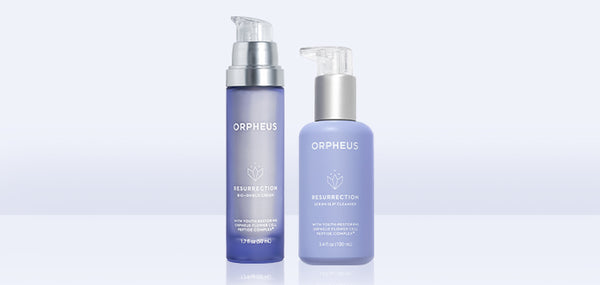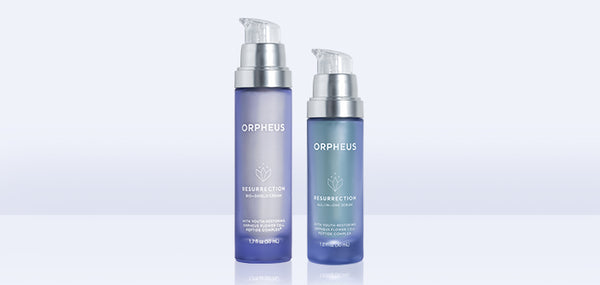Clean skincare makes a big difference—for the better. Clean formulations work in harmony with the skin and do not cause stress that leads to irritation and aging in the way chemical-laden formulas do. Unfortunately, most skincare companies use a plethora of harmful ingredients in their formulas. The good news: we do not. Our plant-based science limits the need of using high levels of preservatives and allows for high efficacy ingredients that work to support and enhance your skin’s natural regenerating processes.
Proudly going above and beyond what it means to be clean, we ban over 5000+ known toxic ingredients and our formulas far exceed the European standards of safety. Our ORPHEUS Blacklist is a shortlist of the most toxic ingredients that you should look out for in skincare. We believe these ubiquitous ingredients are at the root of most skin issues and when they’re removed entirely from your routine, skin can reset and return to a healthy and balanced state.
Our Blacklist
- Phenoxyethanol
- Parabens
- Phthalates
- Sulfates (SLS, SLES, ALS)
- Mineral Oil
- Silicone Dyes or Synthetic colors
- BHA and BHT
- Formaldehyde
- Irritating Essential Oils
- Drying Alcohol
HERE’S WHY WE WILL NEVER USE THE ‘BLACKLIST’ INGREDIENTS
Phenoxyethanol – You will find this gnarly ingredient in almost every skincare or beauty product. Often used as a preservative or stabilizer, phenoxyethanol is very harmful. Made of carcinogenic and toxic compounds, it is dangerous if swallowed, inhaled or absorbed through skin, especially to nursing mothers and infants. It can irritate skin and eyes and has been linked to cause reactions ranging from eczema to life-threatening. Due to its toxicity, the European Economic Community (EEC) Cosmetics Derivative and the Cosmetics Regulation of the European Union approved phenoxyethanol in concentrations only up to 1%. It is widely used as it really works in making formulas more stable but at the cost of your health.
Parabens - An old fashion preservative first introduced in the 1950s, parabens are used to prolong the shelf life of beauty products by their ability to prevent the growth of mold and bacteria. However, studies prove that parabens penetrate deep into the skin and can remain in the body’s tissues and fluids. They are believed to disrupt hormone function by mimicking estrogen. Too much estrogen can trigger an increase in breast cell division and the growth of tumors which is why paraben use has been linked to breast cancer and reproductive issues.
Phthalates – A wide range of chemical compounds originally used to soften plastic to make it easier to work with and today, are commonly used as solvents in skincare to increase shelf life. Although some phthalates are considered safe and are quite prevalent in U.S. products, phthalates are known to be endocrine disrupting chemicals or EDCs—when absorbed by the body, they act as estrogens that interfere with the metabolism and normal hormone function and are proven a health risk.
Sulfates (SLS, SLES, ALS) – It’s this additive that gives products the foamy, bubbly consistency most of us associate as ‘squeaky clean’. Sodium Lauryl Ether Sulfate (SLES) and Ammonium Lauryl Sulfate (ALS) are lesser known but Sodium Lauryl Sulfate (SLS) is the most commonly used. Sulfates, whether they are synthetic or natural, can be very irritating. If used in high enough concentrations, they can damage the outer layers of your skin, resulting in itchy, cracked, dry or chronically inflamed skin.
Mineral Oil - One of the most commonly used oils in skin care products. It is used as an emollient because of its low volatility and smoothing texture when applied to the skin. Derived from petroleum, mineral oil clogs pores, aggravates acne, and negatively impacts skin function causing it to age prematurely. It does not absorb into the skin and offers a mere false sense of moisture—this is because its molecular size is simply too big. As a result, mineral oil remains on the surface of skin, making it a reflector of the sun which can lead to more sun damage and discoloration. We are against it not only because it may be contaminated with cancer-causing polycyclic aromatic hydrocarbons (PAHs) but also because of the barrier effect it has on skin, products with mineral oil and paraffin can actually damage the skin barrier and increase water loss.
Silicone – A filler with superficial skin benefits used to create a more ‘sleek’ feel in a product’s texture and make your face feel nice in the moment. Silicone does not contribute to the long-term health and improvement of your skin. Silicone-based moisturizers form a film on the skin's surface (think of plastic wrap), and that barrier can lock in moisture, but it can also trap dirt, sweat, bacteria, sebum, dead skin cells and other debris along with it.
**** Don’t confuse silicone with silicon dioxide, which is a natural mineral (silica)
Silicon is a natural trace mineral and the second most abundant element in the earth’s crust. When combined with oxygen, silicon forms “silica” (or silicon dioxide), which is essential in our bodies for flexible joints, glowing skin. and stronger nails, teeth, and bones.
Dyes or Synthetic Colors - Both can be highly irritating to the skin. They can block pores and interfere with your skin's natural oil balance which makes you prone to blemishes. Although color in skincare is pretty to look at, it takes up to 25 synthetic chemicals to create one artificial die. For example, if a product has the color purple added to it, it could potentially have 50 or more chemicals in that one color alone.
Drying Alcohol - With the amount of misleading information online in regard to alcohol in skincare, it’s easy to see why some people believe it really isn’t all that bad for skin. However, the research makes it perfectly clear: alcohol as a main ingredient in any skin care product is a problem! When we express concern about the presence of alcohol in skincare or makeup products, we’re referring to a drying type of alcohol that you’ll most often see listed on an ingredient label as SD alcohol, denatured alcohol, or, less often, isopropyl alcohol. These types of volatile alcohols give products a quick-drying finish, immediately degrease skin, and deliver a weightless feel, so it’s easy to see their appeal, especially for those with oily skin. But those short-term benefits end up with negative long-term consequences and cause dryness, irritation, and breakouts.
Irritating Essential Oils - We limit the use of essential oils and only use proven non-irritating essential oils in our hydrating mist for an invigorating, refreshing feel and at such low percentage in order to eliminate any chance of irritation.
Formaldehyde - This highly toxic ingredient is used in cosmetics to slow the growth of bacteria over time. Formaldehyde is a known carcinogen and can cause respiratory issues if inhaled. It should never be applied to the skin—it can cause skin allergies and can be absorbed into the bloodstream.
BHA (butylated hydroxyanisole) and BHT (butylated hydroxytoluene) - Widely used in the food industry as a preservative and sometimes used in skincare, these two ingredients are often found in tandem. BHA is said to be a possible carcinogen and the European Union classifies it as an endocrine disruptor. Both ingredients are also known to cause skin reactions.
The bottom line: clean skincare is not only good for your skin but for your health. Because when you get down to the nitty-gritty of the dirty ingredients found in most skincare, you realize how much of a toll it could take on your overall health over time—especially when you use multiple products, everyday, that have harmful ingredients lurking within. You do the math—yikes! Worry not, friends. ORPHEUS is hard-working skincare for the modern minimalist who wants radiant skin with no worries. We don’t mess around with the dirty—just good clean skincare.
Curious about something you just read? Feel free to reach out with questions! We’d love to hear from you.
Sources:
9 Ways to Avoid Hormone-Disrupting ChemicalsWhat are parabens, and why don’t they belong in cosmetics?
Safety Assessment of Parabens as Used in Cosmetics
#ChemicalCallout: BHT and BHA
The Truth About Food Additive BHA
BHA and BHT: A Case for Fresh?
Silicone in skincare
6 Reasons Why People Avoid Silicones in Skin Care
The Beginner’s Guide to Paraben and Sulfate-Free Hair Products


